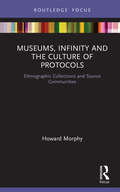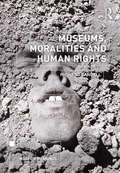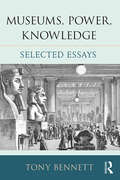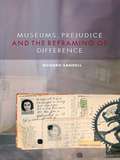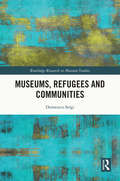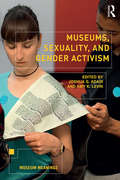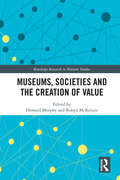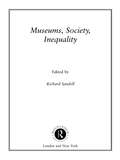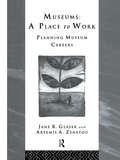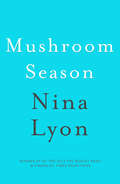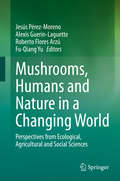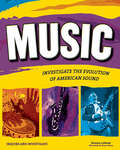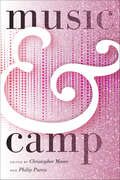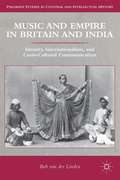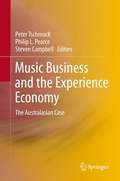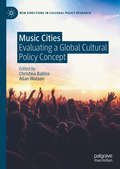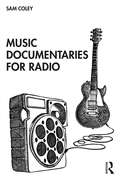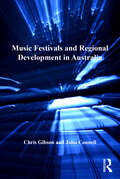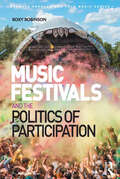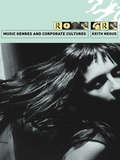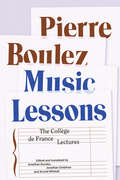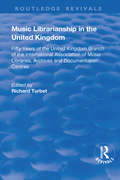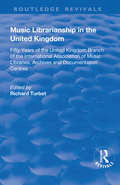- Table View
- List View
Museums, Infinity and the Culture of Protocols: Ethnographic Collections and Source Communities (Museums in Focus)
by Howard MorphyMuseums, Infinity and the Culture of Protocols enters a dialogue about museums’ responsibility for the curation of their collections into an infinite future while also tackling contentious issues of repatriation and digital access to collections. Bringing into focus a number of key debates centred on ethnographic collections and their relationship with source communities, Morphy considers the value material objects have to different ‘local’ communities – the museum and the source community – and the value-creation processes with which they are entangled. The focus on values and value brings the issue of repatriation and access into a dialogue between the two locals, questioning who has access to collections and whose values are taken into consideration. Placing the museum itself firmly at the centre of the debate, Morphy posits that museums constitute a kind of ‘local’ embedded in a trajectory of value. Museums, Infinity and the Culture of Protocols challenges aspects of postcolonial theory that position museums in the past by presenting an argument that places relationships with communities as central to the future of museums. This makes the book essential reading for academics and students working in the fields of museum and heritage studies, anthropology, archaeology, Indigenous studies, cultural studies, and history.
Museums, Moralities and Human Rights (Museum Meanings)
by Richard SandellThis book explores how museums, galleries and heritage sites of all kinds, through the narratives they construct and publicly present, can shape the moral and political climate within which human rights are experienced. Through a series of richly-drawn cases, which focus on gender diversity and same-sex love and desire, Richard Sandell examines the ways in which museums are implicated in the ongoing struggle for lesbian, gay, bisexual, transgender and intersex human rights. Museums, Moralities and Human Rights brings together for the first time the perspectives not only of those who work in, govern, fund and visit museums but also those of rights activists and campaigners who, at key moments in their struggle, have turned their attention to museums to advance their cause. Offering new insights into how human rights are continually fought for, realised and refused, this volume makes the case for museums of all kinds to take up an active, mindful and purposive engagement with contemporary human rights concerns.
Museums, Power, Knowledge: Selected Essays
by Tony BennettFew perspectives have invigorated the development of critical museum studies over the late twentieth and early twenty-first centuries as much as Foucault’s account of the relations between knowledge and power and their role in processes of governing. Within this literature, Tony Bennett’s work stands out as having marked a series of strategic engagements with Foucault’s work to offer a critical genealogy of the public museum, offering an account of its nineteenth-century and early twentieth-century development that has been constantly alert to the politics of museums in the present. Museums, Power, Knowledge brings together new research with a set of essays initially published in diverse contexts, making available for the first time the full range of Bennett’s critical museology. Ranging across natural history, anthropological art, geological and history museums and their precursors in earlier collecting institutions, and spanning the eighteenth to the twenty-first centuries in discussing museum practices in Britain, Australia, the USA, France and Japan, it offers a compelling account of the shifting political logics of museums over the modern period. As a collection that aims to bring together the ‘signature’ work of a museum theorist and historian whose work has long occupied a distinctive place in museum/society debates, Museums, Power, Knowledge will be of interest to researchers, teachers and students working in the fields of museum and heritage studies, cultural history, cultural studies and sociology, as well as museum professionals and museum visitors.
Museums, Prejudice and the Reframing of Difference
by Richard SandellHow, if it all, do museums shape the ways in which society understands difference? In recent decades there has been growing international interest amongst practitioners, academics and policy makers in the role that museums might play in confronting prejudice and promoting human rights and cross-cultural understanding. Museums in many parts of the world are increasingly concerned to construct exhibitions which represent, in more equitable ways, the culturally pluralist societies within which they operate, accommodating and engaging with differences on the basis of gender, race, ethnicity, class, religion, disability, sexuality and so on. Despite the ubiquity of these trends, there is nevertheless limited understanding of the social effects, and attendant political consequences, of these purposive representational strategies. Richard Sandell combines interdisciplinary theoretical perspectives with in-depth empirical investigation to address a number of timely questions. How do audiences engage with and respond to exhibitions designed to contest, subvert and reconfigure prejudiced conceptions of social groups? To what extent can museums be understood to shape, not simply reflect, normative understandings of difference, acceptability and tolerance? What are the challenges for museums which attempt to engage audiences in debating morally charged and contested contemporary social issues and how might these be addressed? Sandell argues that museums frame, inform and enable the conversations which audiences and society more broadly have about difference and highlights the moral and political challenges, opportunities and responsibilities which accompany these constitutive qualities.
Museums, Refugees and Communities (Routledge Research in Museum Studies)
by Domenico SergiMuseums, Refugees and Communities explores the ways in which museums in Germany, The Netherlands and the UK have responded to the complexities and ethical dilemmas involved in discussing the reasons for, and issues surrounding, contemporary refugee displacements. Building upon an ethnographic study carried out in the UK with refugees from the Democratic Republic of Congo, the book explores how object-led approaches can inspire new ways of thinking about and analysing refugees’ experiences and European museums’ work with their communities. Enlarging the developing body of research on museums’ increasing engagement with human rights and focusing in particular on the social, cultural and practical dimensions of community engagement practices with refugees, the book also aims to inform growing debates on museums as sites of activism. Museums, Refugees and Communities offers an innovative and interdisciplinary examination of museum work with and about refugees. As such, it should appeal to researchers, academics and students engaged in the study of museums, heritage, migration, ethics, community engagement, culture, sociology and anthropology.
Museums, Sexuality, and Gender Activism (Museum Meanings)
by Amy K. Levin Joshua G. AdairMuseums, Sexuality, and Gender Activism examines the role of exhibitionary institutions in representing LGBTQ+ people, cisgender women, and nonbinary individuals. Considering recent gender and sexuality-related developments through a critical lens, the volume contributes significantly to the growing body of activist writing on this topic. Building on Gender, Sexuality and Museums and featuring work from established voices, as well as newcomers, this volume offers risky and exciting articles from around the world. Chapters cover diverse topics, including transgender representation, erasure, and activism; two-spirit people, indigeneity, and museums; third genders; gender and sexuality in heritage sites and historic homes; temporary exhibitions on gender and sexuality; museum representations of HIV/AIDS; interventions to increase queer visibility and inclusion in galleries; LGBTQ+ staff alliances; and museums, gender ambiguity, and the disruption of binaries. Several chapters focus on areas outside the US and Europe, while others explore central topics through the perspectives of racial and ethnic minorities. Containing contributions that engage in sustained critique of current policies, theory, and practice, Museums, Sexuality, and Gender Activism is essential reading for those studying museums, women and gender, sexuality, culture, history, heritage, art, media, and anthropology. The book will also spark interest among museum practitioners, public archivists, and scholars researching related topics.
Museums, Societies and the Creation of Value (Routledge Research in Museum Studies)
by Howard Morphy Robyn McKenzieMuseums, Societies and the Creation of Value focuses on the ways in which museums and the use of their collections have contributed to, and continue to be engaged with, value creation processes. Including chapters from many of the leading figures in museum anthropology, as well as from outstanding early-career researchers, this volume presents a diverse range of international case studies that bridge the gap between theory and practice. It demonstrates that ethnographic collections and the museums that hold and curate them have played a central role in the value creation processes that have changed attitudes to cultural differences. The essays engage richly with many of the important issues of contemporary museum discourse and practice. They show how collections exist at the ever-changing point of articulation between the source communities and the people and cultures of the museum and challenge presentist critiques of museums that position them as locked into the time that they emerged. Museums, Societies and the Creation of Value provides examples of the productive outcomes of collaborative work and relationships, showing how they can be mutually beneficial. The book will be of great interest to researchers and students engaged in the study of museums and heritage, anthropology, culture, Indigenous peoples, postcolonialism, history and sociology. It will also be of interest to museum professionals.
Museums, Society, Inequality (Museum Meanings)
by Richard SandellMuseums, Society, Inequality explores the wide-ranging social roles and responsibilities of the museum. It brings together international perspectives to stimulate critical debate, inform the work of practitioners and policy makers, and to advance recognition of the purpose, responsibilities and value to society of museums. Museums, Society, Inequality examines the issues and: offers different understandings of the social agency of the museum presents ways in which museums have sought to engage with social concerns, and instigate social change imagines how museums might become more useful to society in future. This book is essential for all museum academics, practitioners and students.
Museums: Planning Museum Careers (Heritage: Care-Preservation-Management)
by Jane R. Glaser Artemis A. ZenetouSurveying over thirty different positions in the museum profession, this is the essential guide for anyone considering entering the field, or a career change within it. From exhibition designer to shop manager, this comprehensive survey views the latest trends in museum work and the broad-ranging technological advances that have been made. For any professional in the field, this is a crucially useful book for how to prepare, look for and find jobs in the museum profession.
Mushroom Season
by Nina Lyon'Mushroom Season' is a ramble through magic mushrooms, mountains and metaphysics. After heavy sanctions relegated their use to a spell in the stoner wilderness, are psilocybin mushrooms about to help reframe important social and philosophical debates about our minds, and ourselves?Where do they grow? What do they do to our brains? And why are they eschewed by the bourgois? Nina Lyon introduces us to Liberty Caps and Fly Agarics, the characters she encountered as a student tripper and the differences between home-grown hallucinogens and Mexican export. Among the anecdotes and observations are chemical facts, etymological revelations and philosophical speculation. Why are mushrooms subject to social stigma? What are the good effects they might have on us? And how does illegalisation damage a culture of free-thinking and experiment? Taking apart the teenage clichés and middle-class prejudice associated with the drug, Nina Lyon provides a wonderfully entertaining history of the magic mushroom.
Mushrooms, Humans and Nature in a Changing World: Perspectives from Ecological, Agricultural and Social Sciences
by Jesús Pérez-Moreno Alexis Guerin-Laguette Roberto Flores Arzú Fu-Qiang YuThis book focuses on recent advances in our understanding of wild edible mycorrhizal fungi, truffle and mushrooms and their cultivation. In addition to providing fresh insights into various topics, e.g. taxonomy, ecology, cultivation and environmental impact, it also demonstrates the clear but fragile link between wild edible mushrooms and human societies. Comprising 17 chapters written by 41 experts from 13 countries on four continents, it enables readers to grasp the importance of protecting this unique, invaluable, renewable resource in the context of climate change and unprecedented biodiversity loss. The book inspires professionals and encourages young researchers to enter this field to develop the sustainable use of wild edible mushrooms using modern tools and approaches. It also highlights the importance of protecting forested environments, saving species from extinction and generating a significant income for local populations, while keeping alive and renewing the link between humans and wild edible mushrooms so that in the future, the sustainable farming and use of edible mycorrhizal mushrooms will play a predominant role in the management and preservation of forested lands.
Music
by Donna Latham Bryan StoneThe United States boasts a rich musical diversity. Colonial Americans integrated European traditions with new cultural influences to compose a unique musical identity. African traditions influenced hymns and folk songs that connected people to religion and to the trials and tribulations of everyday life. Patriotic tunes created unity in wartime. America's jazz, blues, rock, and hip-hop continue to evolve from their African-American origins. Music: Investigate the Evolution of American Sound invites kids ages 12 and up to explore the roots of American music genres as they investigate the social, political, and religious influences that inspire musicians. Activities encourage readers to inquire into the art and science of music. Readers can engage in a hands-on exploration of the physics of sound vibrations, decibel levels, and acoustics, or use vocal styling to improvise and discover the rhythm of their bodies to create a beatbox. Music encourages readers to analyze lyrics, their meanings, and rhythms, and then use that analysis to write their own songs. This title meets common core state standards in language arts for reading informational text and literary nonfiction and is aligned with Next Generation Science Standards. Guided Reading Levels and Lexile measurements indicate grade level and text complexity.
Music & Camp (Music/culture Ser.)
by Christopher Moore and Philip PurvisThis collection of essays provides the first in-depth examination of camp as it relates to a wide variety of twentieth and twenty-first century music and musical performances. Located at the convergence of popular and queer musicology, the book provides new research into camp's presence, techniques, discourses, and potential meanings across a broad spectrum of musical genres, including: musical theatre, classical music, film music, opera, instrumental music, the Broadway musical, rock, pop, hip-hop, and Christmas carols. This significant contribution to the field of camp studies investigates why and how music has served as an expressive and political vehicle for both the aesthetic characteristics and the receptive modes that have been associated with camp throughout twentieth and twenty-first-century culture.Hardcover is un-jacketed.
Music And Empire In Britain And India
by Bob Van Der LindenMusic has been neglected by imperial historians, but this book shows that music is an essential aspect of identity formation and cross-cultural exchange. It explores the ways in which rational, moral, and aesthetic motives underlying the institutionalization of "classical" music converged and diverged in Britain and India from 1880-1940.
Music Business and the Experience Economy
by Philip L. Pearce Peter Tschmuck Steven CampbellMusic Business and the Experience Economy is the first book on the music business in Australasia from an academic perspective. In a cross-disciplinary approach, the contributions deal with a wide-range of topics concerning the production, distribution and consumption of music in the digital age. The interrelationship of legal, aesthetic and economic aspects in the production of music in Australasia is also highlighted as well as the emergence of new business models, the role of P2P file sharing, and the live music sector. In addition, the impact of the digital revolution on music experience and valuation, the role of music for tourism and for branding, and last but not least the developments of higher music education, are discussed from different perspectives.
Music Cities: Evaluating a Global Cultural Policy Concept (New Directions in Cultural Policy Research)
by Allan Watson Christina BallicoThis book provides a critical academic evaluation of the ‘music city’ as a form of urban cultural policy that has been keenly adopted in policy circles across the globe, but which as yet has only been subject to limited empirical and conceptual interrogation. With a particular focus on heritage, planning, tourism and regulatory measures, this book explores how local geographical, social and economic contexts and particularities shape the nature of music city policies (or lack thereof) in particular cities. The book broadens academic interrogation of music cities to include cities as diverse as San Francisco, Liverpool, Chennai, Havana, San Juan, Birmingham and Southampton. Contributors include both academic and professional practitioners and, consequently, this book represents one of the most diverse attempts yet to critically engage with music cities as a global cultural policy concept.
Music Documentaries for Radio
by Sam ColeyDrawing on both academic research and real world practice, this book offers an in-depth investigation into the production of music documentaries broadcast on radio. Music Documentaries for Radio provides a thorough overview of how the genre has developed technically and editorially alongside a discussion of the practical production processes involved. Digital production equipment and online tools used in music documentary production are discussed in detail, outlining how the development of these technologies shapes the output of producers operating in both the public service and the commercial sectors of the industry. Drawing on his own experiences as an award-winning music documentary producer, the author also looks at how the industry views this form of radio documentary and considers how innovation and technical advances, as well as governmental regulation, have shaped the field. The book demonstrates how changing practices and technical innovations have led to the emergence of multi-skilled, freelance radio producers and how previously separate production roles have merged into one convergent, multifaceted position. Music Documentaries for Radio is an ideal resource for students and academics in the fields of radio studies, media production, documentary-making, and journalism studies.
Music Everywhere! (Global Fund for Children Books)
by Maya Ajmera Cynthia Pon Elise Hofer DerstinePhotographs from around the world celebrate the universal joy that kids get from making music, whether they’re playing instruments, clapping their hands, stomping their feet, or singing. Music can help express one child’s feelings—or it can bring a whole community together.
Music Festivals and Regional Development in Australia
by Chris Gibson John ConnellThroughout the world, the number of festivals has grown exponentially in the last two decades, as people celebrate local and regional cultures, but perhaps more importantly as local councils and other groups seek to use festivals both to promote tourism and to stimulate rural development. However, most studies of festivals have tended to focus almost exclusively on the cultural and symbolic aspects, or on narrow modelling of economic multiplier impacts, rather than examining their long-term implications for rural change. This book therefore has an original focus. It is structured in two parts: the first discusses broad issues affecting music festivals globally, especially in the context of rural revitalisation. The second part looks in more detail at a range of types of festivals commonly found throughout North America, Europe and Australasia, such as country music, jazz, opera and alternative music festivals. The authors draw on in-depth research undertaken over the past five years in a range of Australian places, which traces the overall growth of festivals of various kinds, examines four of the more important and distinctive music festivals, and makes clear conclusions on their significance for rural and regional change.
Music Festivals and the Politics of Participation (Ashgate Popular and Folk Music Series)
by Roxy RobinsonThe spread of UK music festivals has exploded since 2000. In this major contribution to cultural studies, the lid is lifted on the contemporary festival scene. Gone are the days of a handful of formulaic, large events dominating the market place. Across the country, hundreds of ’boutique’ gatherings have popped up, drawing hundreds of thousands of festival-goers into the fields. Why has this happened? What has led to this change? In her richly detailed study, industry insider Dr Roxy Robinson uncovers the dynamics that have led to the formation and evolution of the modern festival scene. Tracing the history of the culture as far back as the fifties, this book examines the tensions between authenticity and commerce as festivals grew into a widespread, professionalized industry. Setting the scene as a fragmented, yet highly competitive market, Music Festivals and the Politics of Participation examines the emergence of key trends with a focus on surrealist production and popular theatricality. For the first time, the transatlantic relationship between British promoters and the social experiment-come-festival Burning Man is documented, uncovering its role in promoting a politics of participation that has dramatically altered the festival experience. Taking an in-depth approach to examining key events, including the fastest growing independent music festival in recent years (Hampshire’s BoomTown Fair) the UK market is shown to have produced a scene that champions co-production and the democratization of festival space. This is a vital text for anyone interested in British culture.
Music Genres and Corporate Cultures
by Keith NegusMusic Genres and Corporate Cultures explores the seemingly haphazard workings of the music industry, tracing the uneasy relationship between economics and culture; `entertainment corporations' and the artists they sign. Keith Negus examines the contrasting strategies of major labels like Sony and Polygram in managing different genres, artists and staff. How do takeovers affect the treatment of artists? Why has Polygram been perceived as too European to attract US artists? And how did Warner's wooden floors help them sign Green Day? Through in-depth case studies of three major genres; rap, country, and salsa, Negus explores the way in which the music industry recognises and rewards certain sounds, and how this influences both the creativity of musicians, and their audiences. He examines the tension between raps public image as the spontaneous `music of the streets' and the practicalities of the market, and asks why country labels and radio stations promote top-selling acts like Garth Brooks over hard-to-classify artists like Mary Chapin-Carpenter, and how the lack of soundscan systems in Puerto Rican record shops affects salsa music's position on the US Billboard chart. Drawing on over seventy interviews with music industry personnel in Britain and the United States, Music Genres and Corporate Cultures shows how the creation, circulation and consumption of popular music is shaped by record companies and corporate business styles while stressing that music production takes within a broader culture, not totally within the control of large corporations.
Music Lessons: The Collège de France Lectures
by Pierre BoulezThe eminent French composer’s groundbreaking lectures, available for the first time in English: “a major event” (Alex Ross).Music Lessons collects the yearly lectures of French composer Pierre Boulez, prepared for the Collège de France between 1976 and 1995. These lectures offer a sustained intellectual engagement with themes of creativity in music by a widely influential cultural figure, who has long been central to the conversation around contemporary music. In his essays Boulez explores the process through which a musical idea is realized in a full-fledged composition; the complementary roles of craft and inspiration; the degree to which the memory of other musical works can influence and change the act of creation; and other deeply fascinating topics. Boulez also gives a penetrating account of problems in classical music that are still present today, such as the crippling conservatism of many musical institutions. Woven into the discussion are stories of Boulez’s own compositions and those of fellow composers whose work he championed, as both a critic and conductor: from Stravinsky to Stockhausen and Varèse, from Bartók to Berg, Debussy to Mahler and Wagner, and all the way back to Bach.This edition includes a foreword by Jean-Jacques Nattiez and a preface by Jonathan Goldman.
Music Librarianship in the UK: Fifty Years of the British Branch of the International Association of Music Librarians
by Richard TurbetThis title was first published in 2003. The UK branch of the International Association of Music Libraries was founded in 1953. This volume of specially commissioned essays celebrates the golden jubilee of branch's foundation and surveys the achievements of the last 50 years. With an emphasis on practical music librarianship, the essays examine the challenges that have faced the profession in recent years, as well as current developments in the field and the impact of modern advances in information technology.
Music Librarianship in the UK: Fifty Years of the British Branch of the International Association of Music Librarians (Routledge Revivals Ser.)
by Richard TurbetThis title was first published in 2003. The UK branch of the International Association of Music Libraries was founded in 1953. This volume of specially commissioned essays celebrates the golden jubilee of branch's foundation and surveys the achievements of the last 50 years. With an emphasis on practical music librarianship, the essays examine the challenges that have faced the profession in recent years, as well as current developments in the field and the impact of modern advances in information technology.
